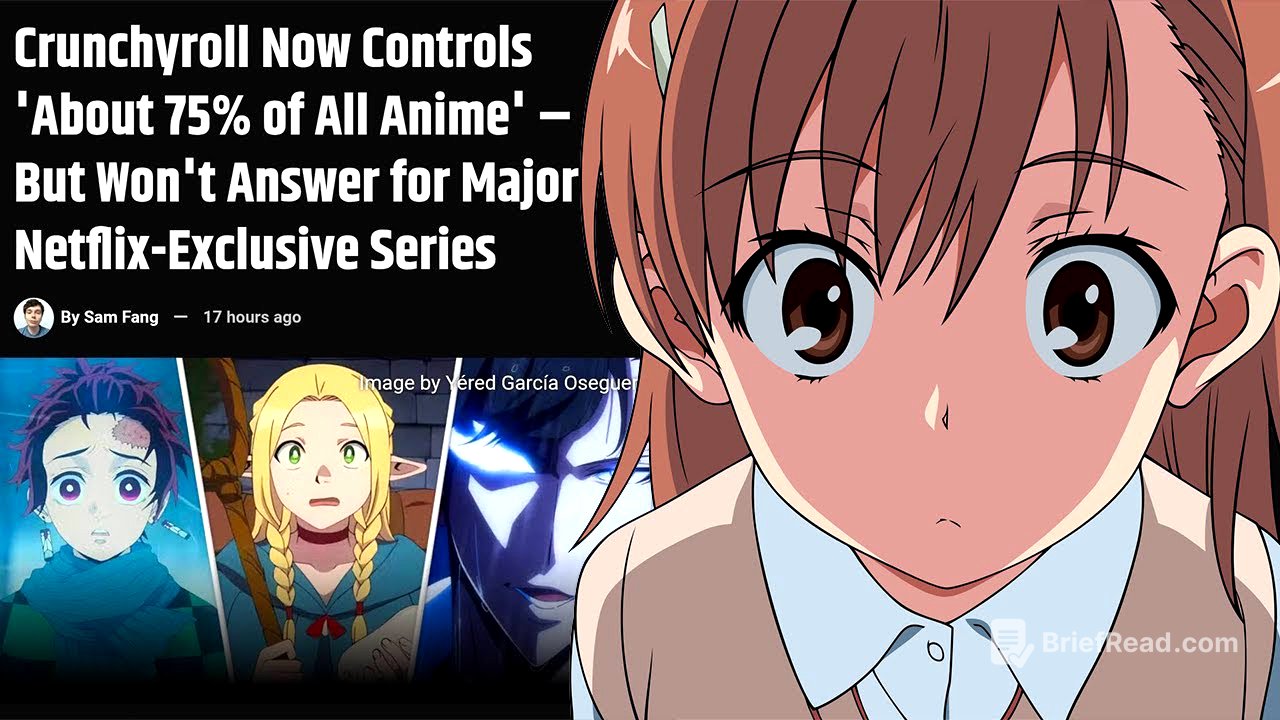TLDR;
The video discusses Crunchyroll's growing dominance in the anime streaming market, with claims that it controls around 75% of the anime being produced or licensed. This level of control raises concerns about potential monopolies, reduced content diversity, and the impact on smaller distributors. The video also touches upon Crunchyroll's involvement in anime production and its preference for exclusive content, which could limit viewer choices and potentially stifle innovation in the industry.
- Crunchyroll's control of 75% of the anime market raises monopoly concerns.
- Exclusivity and content diversity are major issues due to Crunchyroll's influence.
- Crunchyroll's involvement in anime production impacts content creation and availability.
Crunchyroll's Market Dominance [0:00]
Crunchyroll now controls about 75% of the anime streaming market, which is a pretty big deal. This dominance brings up questions about competition and how anime is distributed. Crunchyroll has grown a lot and is now a major player in licensing and even producing anime. Because Crunchyroll is so dominant, many viewers are using it as their main source for anime. Even though it's grown so much, Crunchyroll hasn't said anything about being involved with big Netflix exclusive series, which makes their business dealings a bit unclear.
Impact on Viewers and Content Diversity [2:12]
If Crunchyroll controls such a large part of the market, it has big implications for viewers. While having so many titles in one place might be convenient, it also raises concerns about how diverse and accessible the content is. If one platform has so much control, it can shape the types of shows that get made, and viewers might miss out on a wider range of stories. Competition in the anime streaming world is super important for making sure there's varied content. When one platform has the majority, there's less incentive to take creative risks.
Monopoly Concerns and Lack of Innovation [2:59]
No company should have a monopoly because it means they don't need to innovate or improve their content. If a company owns most of the entertainment culture and doesn't have any real competition, why would they bother improving their website or user experience? The only time they might listen to customers is if they start losing money and people cancel their subscriptions, which could lead to piracy. Crunchyroll doesn't just have a grip on anime in the West; they also have a lot of influence at the source in Japan through Aniplex, which is also owned by Sony.
Influence on Anime Production and Content [4:36]
With Crunchyroll's influence, they can shape which anime get made and which ones get canceled. This can lead to safer, more repetitive projects instead of unique and innovative ones. Shonen anime is a big money maker, and Crunchyroll sees this. If this trend continues, Crunchyroll will put more resources into producing anime like "Solo Leveling," which could overshadow other types of series, like slice-of-life anime. Crunchyroll is involved in producing anime projects at the source in Japan. Even if you try to avoid Crunchyroll by pirating, you're still supporting them if you watch shows they helped produce.
Exclusivity and Sabotaging Shared Rights [6:59]
The CEO of Crunchyroll wants more exclusives on the platform, meaning people would have to subscribe to Crunchyroll to legally watch certain anime. Crunchyroll has also been known to hinder the advertisement of anime that they have to share exclusive rights with. For example, they didn't advertise "Dondon" because they had to share the rights with Netflix. This desire for exclusivity and the amount of control Crunchyroll has is a dark time for the anime community, and things are getting worse.









